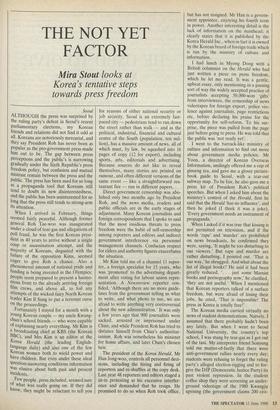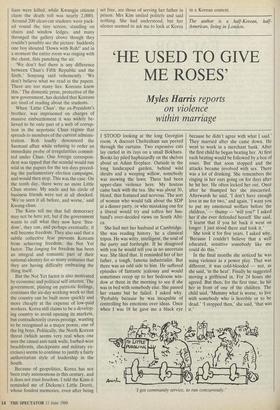THE NOT YET FACTOR
Mira Stout looks at
Korea's tentative steps towards press freedom
Seoul ALTHOUGH the press was surprised by the ruling party's defeat in Seoul's recent Parliamentary elections, my Korean friends and relations did not find it odd at all. Koreans are notoriously mercurial, and they say President Roh has never been as Popular as the pro-government press made him out to be. The gap between press Perceptions and the public's is narrowing gradually under the Sixth Republic's press freedom policy, but confusion and mutual mistrust remain between the press and the public. The press has been used for so long as a propaganda tool that Koreans still tend to doubt its new disinterestedness, and the public has been uninterested for so long that the press still tends to strong-arm its attention.
When I arrived in February, things seemed fairly peaceful. Although former general Roh Tae-Woo was inaugurated under a cloud of tear-gas and allegations of poll fraud, he was the first Korean presi- dent in 40 years to arrive without a single coup or assassination attempt, and the majority of Koreans, disgusted with the failure of the opposition Kims, seemed eager to give Roh a chance. Also a Phenomenal amount of national pride and funding is being invested in the Olympics: People seem prepared to present a harmo- nious front to the already arriving foreign film crews, and above all, to foil any attempts of the Wicked-fairy North Korean leader Kim II Sung to put a terrorist curse on the proceedings. Fortunately I stayed for a month with a young Korean couple — my uncle Kwang- chun's school friends — who were capable of explaining nearly everything. Mr Kim is a broadcasting chief at KBS (the Korean BBC), and Mrs Kim is an editor at the 4rea Herald (the leading English- language daily) and also one of the few Korean women both to wield power and have children. But even under these ideal question-answering conditions information was elusive about both past and present incidents.
Few people, press included, seemed sure of what was really going on. If they did know, they might be reluctant to tell you for reasons of either national security or job security. Seoul is an extremely fast- paced city — pedestrians tend to run down the street rather than walk -- and as the political, industrial, financial and cultural centre of the South (population, ten mil- lion), has a massive amount of news, all of which must, by law, be squashed into 16 pages of copy (12 for export), including sports, arts, editorials and advertising. Because sources do not like to reveal themselves, many stories are printed on rumour, and often different versions of the same event — like a straightforward res- taurant fire — run in different papers.
Direct government censorship was abo- lished only two months ago by President Roh, and the news media, readers and public officials are in the early stages of adjustment. Many Korean journalists and foreign correspondents that I spoke to said that the most insidious threats to press freedom were the habit of self-censorship among reporters and editors and indirect government interference via personnel management channels. Confucian respect for elders and authority figures ekacerbates the situation.
Mr Kim told me of a channel 11 repor- ter, a foreign specialist for 15 years, who was 'promoted' to the advertising depart- ment after voting for labour union repre- sentation. A Newsreview • reporter con- fided, 'Although there are no more guide- lines from the government telling us what to write, and what photo to use, we are afraid to write anything very controversial about the new administration.' It was only a few years ago that 906 journalists were sacked, arrested or imprisoned under Chun, and while President Roh has tried to distance himself from Chun's authoritar- ianism, Roh was nonetheless his minister for home affairs, and later Chun's chosen heir.
The president of the Korea Herald, Mr Han Jong-woo, controls all personnel deci- sions, including the hiring and firing of reporters and re-shuffles at the copy desk. Last year 48 reporters and editors staged a sit-in protesting at his excessive interfer- ence and demanded that he resign. He promised to do so when Roh took office, but has not resigned. Mr Han is a govern- ment appointee, enjoying his fourth term in power. Another interesting detail is the lack of information on the masthead; it clearly states that it is published by the Korea Herald Inc., when in fact it is owned by the Korean board of foreign trade which is run by the ministry of culture and information.
I had lunch in Myong Dong with a British columnist on the Herald who had just written a piece on press freedom, which he let me read. It was a gentle, upbeat essay, only mentioning in a passing sort of way the widely accepted practice of journalists 'accepting 50,000-won 'gifts' from interviewees, the censorship of news videotapes for foreign export, police vio- lence against journalists, page restrictions etc, before declaring his praise for the opportunity for self-reform. To his sur- prise, the piece was pulled from the page just before going to press. He was told that the public was 'not ready yet'.
I went to the barrack-like ministry of culture and information to find out more about government media policies. Mr Yoon, a director of Korean Overseas Information, smilingly offered me a cup of ginseng tea, and gave me a glossy picture- book guide to Seoul, with a tear-out subway map. To be fair, he also gave me a press kit of President Roh's political speeches. But when I asked him about the ministry's control of the -Herald, first he said that the Herald 'has no influence', and then he joked (I think it was a joke), 'Every government needs an instrument of propaganda.'
When I asked if it was true that kissing is not permitted on television, and if the words 'rape' and 'murder' are prohibited on news broadcasts, he confirmed they were, saying, 'It might be too disturbing to our viewers.' But rape and murder are rather disturbing, I pointed out. 'That is our way,' he shrugged. And what about the list of illegal books? He said it had been greatly reduced, `. . . just some Marxist books and pornography now,' he clarified, 'they are not useful.' When I mentioned that Korean reporters talked of a surface freedom, but were afraid of losing their jobs, he cried, 'That is impossible! The press in Korea is totally free!'
The Korean media carried virtually no news of student demonstrations. Naively, I assumed that there probably hadn't been any lately. But when I went to Seoul National University, the country's top school, I was stung by tear-gas as I got out of the taxi. My interpreter friend Sonyung told me matter-of-factly that there were anti-government rallies nearly every day; students were refusing to forget the ruling party's alleged election-rigging and to for- give the DJP (Democratic Justice Party) its past violent repression. In the student coffee shop they were screening an under- ground videotape of the 1980 Kwangju uprising (the government claims 200 civi- lians were killed, while Kwangju citizens claim the death toll was nearly 2,000). Around 200 clean-cut students were pack- ed round the tiny screen, standing on chairs and window ledges, and many thronged the gallery above though they couldn't possibly see the picture. Suddenly one boy shouted 'Down with Roh!' and in a moment the entire room was ringing with the chant, fists punching the air.
'We don't feel there is any difference between Chun's Fifth Republic and the Sixth,' Sonyung said vehemently. 'We don't believe what we read in the papers. There are too many lies. Koreans know this.' The domestic press, protective of the new government, has decided that Koreans are tired of reading about the students.
When 'Little Chun', the ex-President's brother, was imprisoned on charges of massive embezzlement it was widely be- lieved to be only part of a web of corrup- tion in the nepotistic Chun regime that spreads to members of the current adminis- tration. Roh loudly denounced the Saemaul affair while refusing to order an immediate probe of irregularities commit- ted under Chun. One foreign correspon- dent was tipped that the scandal would run wild in the papers for the ten days preced- ing the parliamentary election campaigns, and would then stop. This was the case. On the tenth day, there were no more Little Chun stories. My uncle and his circle of business friends were not at all shocked. 'We've seen it all before, and worse,' said Kwang-chun.
The Kims tell me that full democracy may not be here yet, but if the government wants to call what they now have 'free- dom', they can, and perhaps eventually, it will become freedom. They also said that a subtle collective fear prevents Koreans from achieving freedom; the Not Yet factor. The longing for freedom has been an integral and romantic part of their national identity for so many centuries that they are having difficulty embracing the thing itself.
But the Not Yet factor is also motivated by economic and political self-interest. The government, playing on patriotic feelings, continues the six-day working week so that the country can be built more quickly and more cheaply at the expense of low-paid workers. Korea still claims to be a develop- ing country to avoid opening its markets, but contradictorily craves prestige, wanting to be recognised as a major power, one of the big boys. Politically, the North Korean threat (which seems very real when one sees the casual anti-tank walls, barbed-wire beachfronts, checkpoints and military ex- ercises) seems to continue to justify a fairly authoritarian style of leadership in the South.
Because of geopolitics, Korea has not been truly autonomous in this century, and it does not trust freedom. I told the Kims it reminded me of Dickens's Little Dorrit, whose fondest memories, even after being set free, are those of serving her father in prison. Mrs Kim smiled politely and said nothing. She had understood, but her silence seemed to ask me to look at Korea in a Korean context.
The author is a half-Korean, half- American, living in London.



































































 Previous page
Previous page